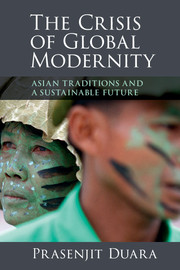‘Modernity in its Western guise has generated a degraded, unsustainable world. To find the basis for a more viable, ‘post-Western modernity', Duara maintains that we must look beyond this tradition. Drawing on a capacious command of Asian history and society, Duara probes the region’s older philosophies to offer a vision that might nurture a truly global commons. This is work that is ambitious in the best possible sense.’
Jean Comaroff - Harvard University, Massachusetts
‘Duara’s opus is both timely and important. By re-vitalizing ancient Asian traditions which also emphasize sustainability, we can develop a stronger global consensus to protect our global commons. Duara’s magnificent book will do the world a great service.’
Kishore Mabhubani - National University of Singapore
‘Incisive and inspiring … Duara draws on his deep knowledge of China and other Asian philosophical traditions. He locates rich dialogical resources for alternative modes of human flourishing. This book is a profound challenge to received models of modernity.’
Kenneth Dean - McGill University, Montréal
‘Ranging across history, religion, politics and ethics as they have appeared in multiple traditions, Duara draws out implications of our now-global quest for 'modernity' and 'development' for environmental sustainability. This is a provocative intervention in some of the most fundamental issues of our times.’
Kenneth Pomeranz - University of Chicago
‘The intersection of the personal, the ecological, and the universal is a key vector in Prasenjit Duara's disentangling of what it will take to achieve the 'physical salvation' of our world. This is a brilliant text; it contributes to the methodological understanding of our period.’
Saskia Sassen - Columbia University, author of Expulsions
'The perspective of The Crisis of Global Modernity is thus post-secular and post-national: Duara recognizes that the climate crisis has indeed changed everything and that it is futile to attempt to engage with it through the 19th and 20th century frameworks of economy and governance that created it in the first place.'
Amitav Ghosh
Source: www.amitavghosh.com/blog
'Prominent historian Duara has done some of the best historical studies on Asia, and in particular on China … In this new book, Duara expands his profound knowledge of China and other Asian societies to the entire globe, and offers a historical sociology of global modernity. … Duara maintains that Western modernity, marked by secularism and individualism, is in deep crisis; environmental degradation worldwide, the rise of non-Western powers, and the loss of transcendent authority all pose severe challenges to the national-modernization model. As Duara sees it, traditional philosophical thought in Asia, particularly Confucianism, may offer a viable path forward. Oriental wisdom, such as the emphasis on self-cultivation, harmony, cooperation, and responsibility, can help the modern world transcend national sovereignty and achieve physical salvation of the planet. While theoretically ambitious, the book’s biggest strength lies in its rich historical narrative … intellectually rewarding. Summing up: highly recommended.'
J. Li
Source: Choice
'… a short review of it at best can only be an invitation to readers to take it on. But is the reward is more than worth it. … At the end of the day, perhaps most reassuring is our confidence in the hopeful Duara who has, on thinking through this crisis of global modernity, recommended a way forward for us.'
Roger T. Ames
Source: Pacific Affairs
'… a questing, ambitious and occasionally polemical work that charts his [Duara’s] search for an Asian-inspired new ecological consciousness. … By presenting his inspiring new vision of an evolving pan-Asian civic-minded solidarity, Duara, with all his usual elegance and erudition, enables us to share in that hope.'
Roy Starrs
Source: Journal of World History




